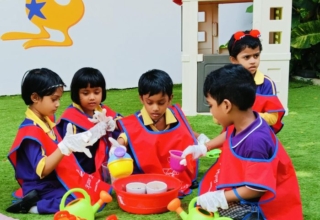
A lot of parents are usually concerned about how to avoid making children feel bad about themselves when talking about weight. Helping more children to achieve a healthy weight can reduce their risk of developing diseases, such as diabetes or hypertension, in later life. Physical activity and healthy eating can also help to improve children’s self-esteem and well-being, so it is important to encourage them in their own right, as well as to maintain a healthy weight.
Now a research finds that ‘Talking to your child about weight’, offer practical suggestions that can help frame these conversations more positively. Researchers at University of Bath in association with the British Dietetic Association (BDA) Obesity and Pediatric Specialist Groups found a way to overcome the challenge of finding the right time and best way to talk to children (aged 4-11) about their weight.
The research covers themes such as understanding what influences children’s thoughts around weight, reducing blame, and talking more positively about food and physical activity in the home and family setting. The guidance was developed by combining extensive research with expert input, including the views of children and parents.
Children know that their weight is a sign of whether they are ‘growing properly’ and expect parents to talk to them about this. Talking about weight may be a bigger deal to you than it is to them. Letting children know that weight is something they can talk about – and is just one part of how we know if they are healthy – can help to reduce shame around weight.
Parents have a big influence on how your child thinks and feels about their weight. What you do and say counts. Your child learns from you all the time and will copy what you do. What you say, what you do, and how you talk about yourself and others are very important in teaching your child about weight and size. Children learn to judge people by their weight and size if they see or hear others doing it – you can’t control everything they see or hear, but you can try to:
- Avoid criticising your own weight or appearance and that of other people – this can make children think this is how you will judge them too
- Greet people by saying how nice it is to see them rather than with comments about their appearance • Talk about making changes to help your child grow, be healthy and do the things they want to do (play, learn etc.) rather than to control weight Talk positively about food and physical activity
- Help your child to learn that eating a range of foods and being active are normal and enjoyable, not things to be done only to control our weight
- Try and make sure your child sees you eating a range of foods and being active yourself—most of the time
Small conversations can work better than one ‘big’ talk. Talk about growth and health where it comes up in everyday conversations and focus on these rather than weight itself. Focus on the things your child can do to look after their health (keep active, eat their greens etc.). Don’t feel you have to talk about everything in one go.
Teach children that everyone deserves respect, whatever their body size, shape or ability – this will help them not to worry about their own body too. If you talk about your child’s weight, let them know it’s because you want them to grow well and be healthy, not to look a certain way. Talk about the amazing things our bodies can do, regardless of size.
Lead researcher, Professor Fiona Gillison of the Department for Health at the University of Bath, explained, “Creating the guidance has been the result of many years of work to try and reduce some of the anxiety, and help families to have open and constructive conversations about weight – if and when they need to. It is great to see it finally published, and we hope it will be helpful to many parents and caregivers who want to support their children around this topic.”










